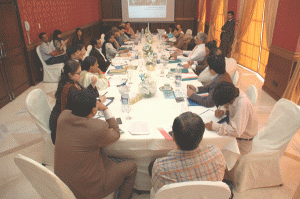Rural Microfinance Roundtable
33 percent of all bank branches are in rural areas, where 67 percent of the nation’s population resides, Syed Mohsin Ahmed, CEO, Pakistan Microfinance Network (PMN), shared at a roundtable discussion on the Rural Finance Market in Pakistan.

PMN organized the conference to discuss the challenges and potential of the sector with key stakeholders. The conference was based on research conducted by PMN to profile the rural economy of Pakistan for microfinance. The rapid growth of microfinance in Pakistan in recent years has occurred largely without formal analysis, resulting in over-targeting of certain segments of the population while rural outreach remains comparatively limited.
Special Secretary Finance, Mr. Asif Bajwa, the Chief Guest, spoke of the efforts of PMN to bring formal financial services to the unbanked population of Pakistan – and the importance of research and analysis so that sustainable systems are set up in the microfinance sector. He stated that there was a need to clarify what is meant by rural finance and to develop sustainable finance for the rural sector.
Dr. Sohail J. Malik, of Innovative Development Strategies, who was commissioned the “Profiling Pakistan’s Rural Economy for Microfinance” study (second of the two studies on rural finance under discussion), also shared insights into the opportunities in this field.
Dr. Rashid Bajwa, Chairman of PMN stated that PMN has a set of recommendations from the sector to facilitate penetration of the rural market, allowing rural populations access to formal financial services.
Ahmed, CEO, PMN, highlighted that it is important to realize that agri-credit is not the extent of rural finance it includes agri-finance, livestock finance, rural enterprise development finance and finance for the development of diversified services.
All the stakeholders at the roundtable agreed upon the need to create a task force dedicated to crystallizing policy initiatives required by the sector.
Climate Friendly launches world-first FlightPortal
Climate Friendly has launched its new FlightPortal™, an innovation that makes it simple to measure and offset business flight emissions through supporting new clean energy projects.

“Carbon offsetting can represent a smart corporate social responsibility (CSR) investment. Each offset dollar can deliver social and economic benefits to developing communities, support new clean energy technologies, and give a business a reportable reduction in their footprint”, says Climate Friendly CEO, Freddy Sharpe.
Thousands of tonnes of CO2 have already been offset through FlightPortal with pioneer clients supporting projects spanning wind, geothermal, sustainable biomass and micro hydro across Europe, Asia and the Pacific region. Customers include the Union of European Football Associa-tions (UEFA), Macquarie Group, Brisbane City Council and Worldwide Fund for Nature (WWF). WWF is a key partner and supporter of Climate Friendly.
“Staff air travel is unavoidable for many organisations so offsetting becomes the only option for taking responsibility for the resulting emissions. Staff are increasingly demanding support from management for these sustainability measures,” concludes Sharpe.
Flight Portal is designed specifically to link the global corporate travel sector to the global clean energy sector. Flight Portal is available to clients globally with support from a network of the world’s leading travel management companies (TMC).
Biodiversity Day 2010 Celebrated at Ziarat
IUCN Pakistan’s Ziarat Office celebrated International Biodiversity Day in collaboration with local schools on 22 May. More than 160 students and teachers participated in a ‘Biodiversity Day Walk’Latera ‘Cleaning the Environment Competition’ was also held at ‘Prospects Point’ a local tourist spot. students collected 70 bags of litter from the area weighing more than 800 kg containing mostly plastic.
Ghulam Qadir, Manager, IUCN Pakistan Juniper Conservation Project, Ziarat stressed that our individual roles can make a difference in maintaining our biodiversity, resources and sustainable environment. He encouraged students to act as environmental ambassadors.

The year 2010 has been declared as the International Year of Biodiversity, to improve understanding of the need for biodiversity conservation and boosting collective action. Promoting a message, Biodiversity is life, Biodiversity is our life, the year is being celebrated through numerous global events, actions and initiatives. The theme for this year’s International Day of Biodiversity is ‘Biodiversity, Development and Poverty Alleviation’.





